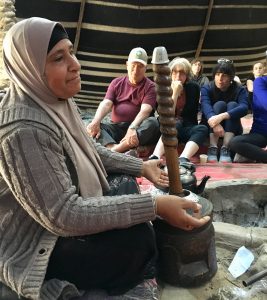Women in the Lead – A Weekly Letter from Rabbi Davis – January 25, 2019
Shalom Chaverim,
On my recent trip to Israel, I met a number of accomplished, impressive and inspiring women. On our first day in Yafo, I met Golda Meir, Israel’s first and only female Prime Minister to date. In Caesarea, I met Hannah Szenes, the poet and paratrooper who gave her life to save Hungarian Jews.
 One of the most interesting contemporary women we met was Basmah. Basmah is a Bedouin woman and she told us her story as she made us coffee in a tent down by the Dead Sea.
One of the most interesting contemporary women we met was Basmah. Basmah is a Bedouin woman and she told us her story as she made us coffee in a tent down by the Dead Sea.
Basmah grew up in a typical, traditional Bedouin society. After getting married, she began a family and cared for her children. But when her husband came home one day and announced that he was taking an additional wife, that did not sit well her. She had no grounds on which to object, but she was not happy. Basmah realized then that she yearned for greater independence. She wanted to be self-reliant. So, she went back to school, taught herself English and about the hospitality industry. In the process, she taught her children to dream big dreams, to demand dignity for themselves, to take responsibly for their future.
Thinking about Basmah, I am reminded of a passage in this week’s parasha, Yitro. When the Israelites approach Mt Sinai, Yitro instructs Moshe to establish a leadership council: “select capable men, trustworthy men and set them as leaders of thousands, hundreds, fifties and tens.” Why didn’t Yitro consider appointing women? After all, Miriam the Prophetess had just led the Israelites at the Sea. His own daughter, Tzipporah, had taken decisive action in the desert.
Ramban’s explanation of the term “capable men” hints an answer: “In matters of justice, a “capable man” (ish chayil) is one who is wise, energetic and honest, just as the capable wife (eshet chayil) is energetic and knowledgeable about running a household.” Ramban suggests that women are equally capable but that their sphere of influence revolves around their home.
The comment is both surprising and not surprising. It’s surprising because Ramban knows many examples in the Bible of “capable women” who demonstrate important leadership outside their home (such as in the poem, Eshet Chayil that he quotes.) On the other hand, we should not expect a medieval rabbi let alone a biblical character to hold the same opinions about the capabilities of women as we hold. We must not judge them by 20th century standards.
“But we can hold today’s Yitro’s in our own communities to such standards,” writes Ellen Frankel in The Five Books of Miriam. “Especially since the burdens of leadership have not gotten any lighter- and since capable, God-fearing, trustworthy women now stand ready to share them.”
Today, a record number of highly capable women are applying their wisdom and energy to leadership (government, business, philanthropy, etc.). In the process, they are teaching all of us to dream big dreams, to demand dignity and to take responsibility for ensuring our future.
Bivrakha,
Rabbi Alexander Davis
adavis@bethelsynagogue.org
